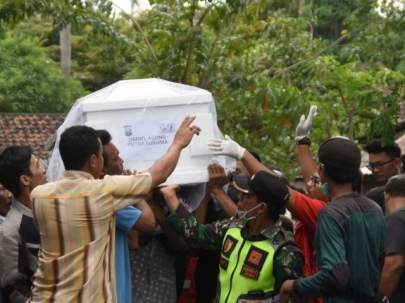ISIS-Linked Jihadists Massacre Christian Farmers in Indonesia

The remote Indonesian village of Kalemago held a mass funeral Wednesday for four coffee farmers murdered by jihadists the previous day.
The primarily Christian residents of the village demanded “firm action” against the killers and seemed skeptical they would get it.
“Our hope for the government, the president, is to resolve this. If not, we will no longer be able to go out to earn a living. Frankly, we feel that no one is paying attention to us,” village secretary Otniel Papunde told Voice of America News (VOA).
The regional police said they know the identity of the five assailants, members of a group called the East Indonesian Mujahedeen or Mujahedeen Indonesia Timur (MIT). The group has been active since 2010 and swore allegiance to the Islamic State in 2014. Its founder, Abu Wardah Santoso, was killed by Indonesian security forces in 2016.
MIT has grown more aggressive over the past few years, killing four people and burning houses and a church in an assault on another village in November. ISIS has another affiliate in Indonesia called Jemaah Anshorut Daulah (JAD) that leans more toward shootings and suicide bombings in urban areas.
ISIS persists in viewing Indonesia, the world’s largest majority Muslim country, as a growth opportunity. The Indonesian military warns that ISIS and its affiliated groups are active in nearly every province of the country. Younger recruits have been significantly more aggressive than older Indonesian Islamists, although the old guard can lay claim to the worst atrocity in Indonesian history, the al-Qaeda-linked Bali nightclub bombing in 2002.
Al-Qaeda still wants a piece of the action, too, but its major appendage in Indonesia, Jemaah Islamiyyah (JI), has been struggling ever since the post-Bali crackdown by counter-terrorism agencies. Security analysts believe JI is still the largest Indonesian terrorist gang, with about 6,000 members, but it has grown relatively quiet while the smaller ISIS-linked groups grab headlines, their operational tempo increasing as seasoned fighters return home from fighting for the “caliphate” in Iraq and Syria.
The ISIS groups seem particularly keen on attacking Christians, as in the case of the assault on coffee farmers in Kalemago. JAD militants injured twenty people with a suicide bomb attack on a church during Palm Sunday mass on Sulawesi Island, where the Poso district and village of Kalemago are located.
In December, four Salvation Army members were murdered at a remote outpost by suspected MIT gunmen. One of the victims was beheaded. The Kalemago attackers also attempted to behead their victims, and reportedly succeeded with one of them.
Source: https://www.breitbart.com/national-security/2021/05/14/isis-linked-jihadists-massacre-christian-farmers-in-indonesia/




